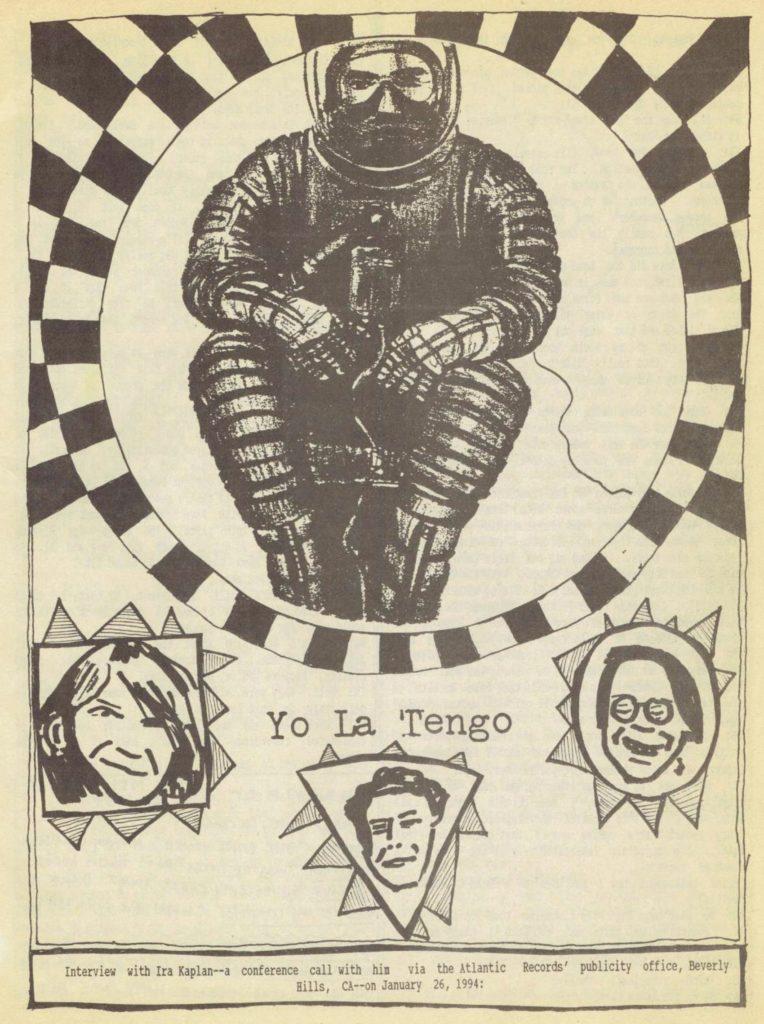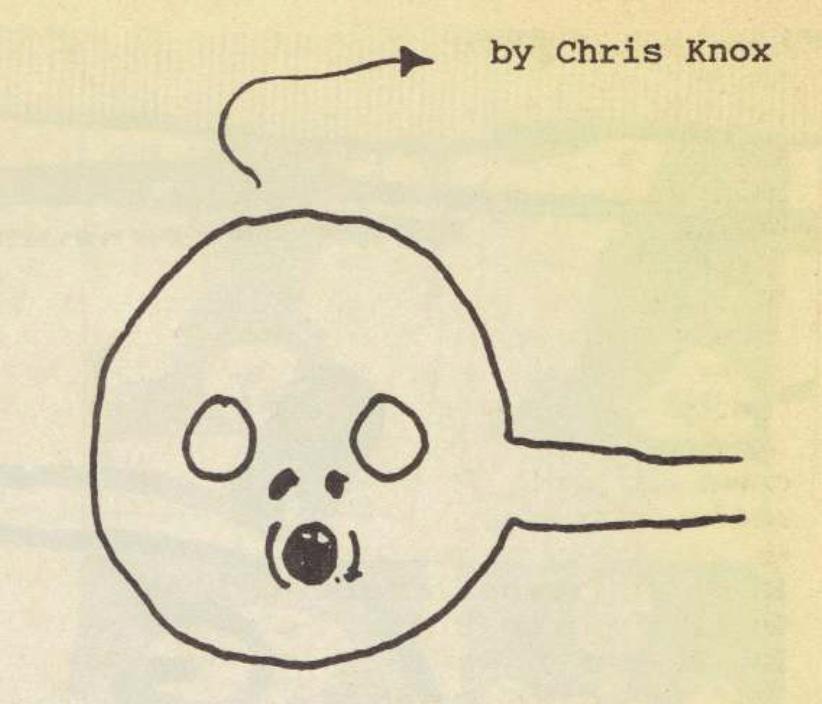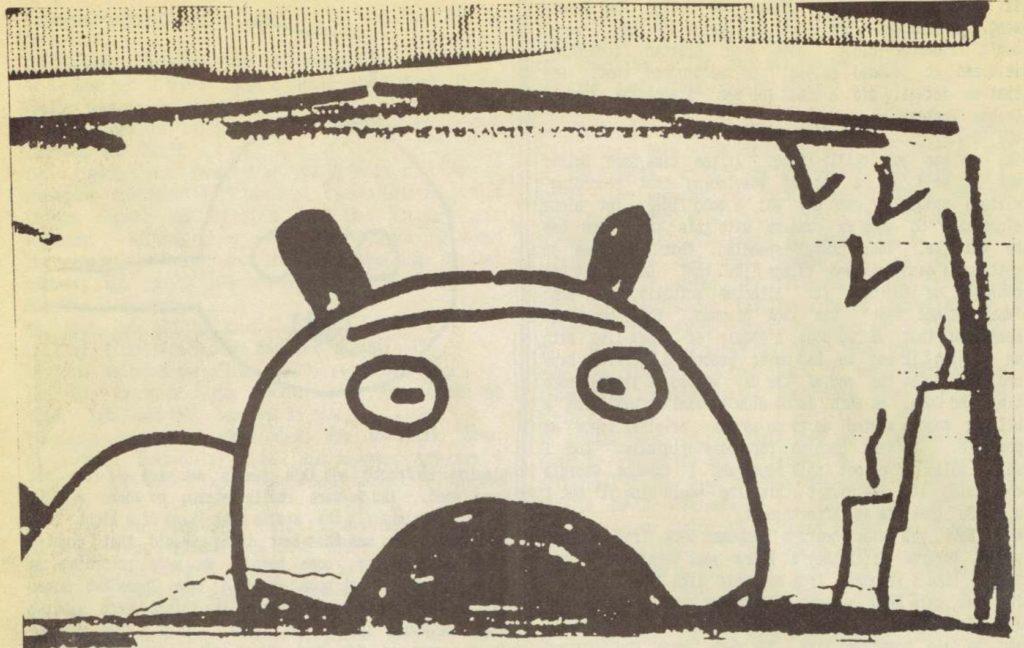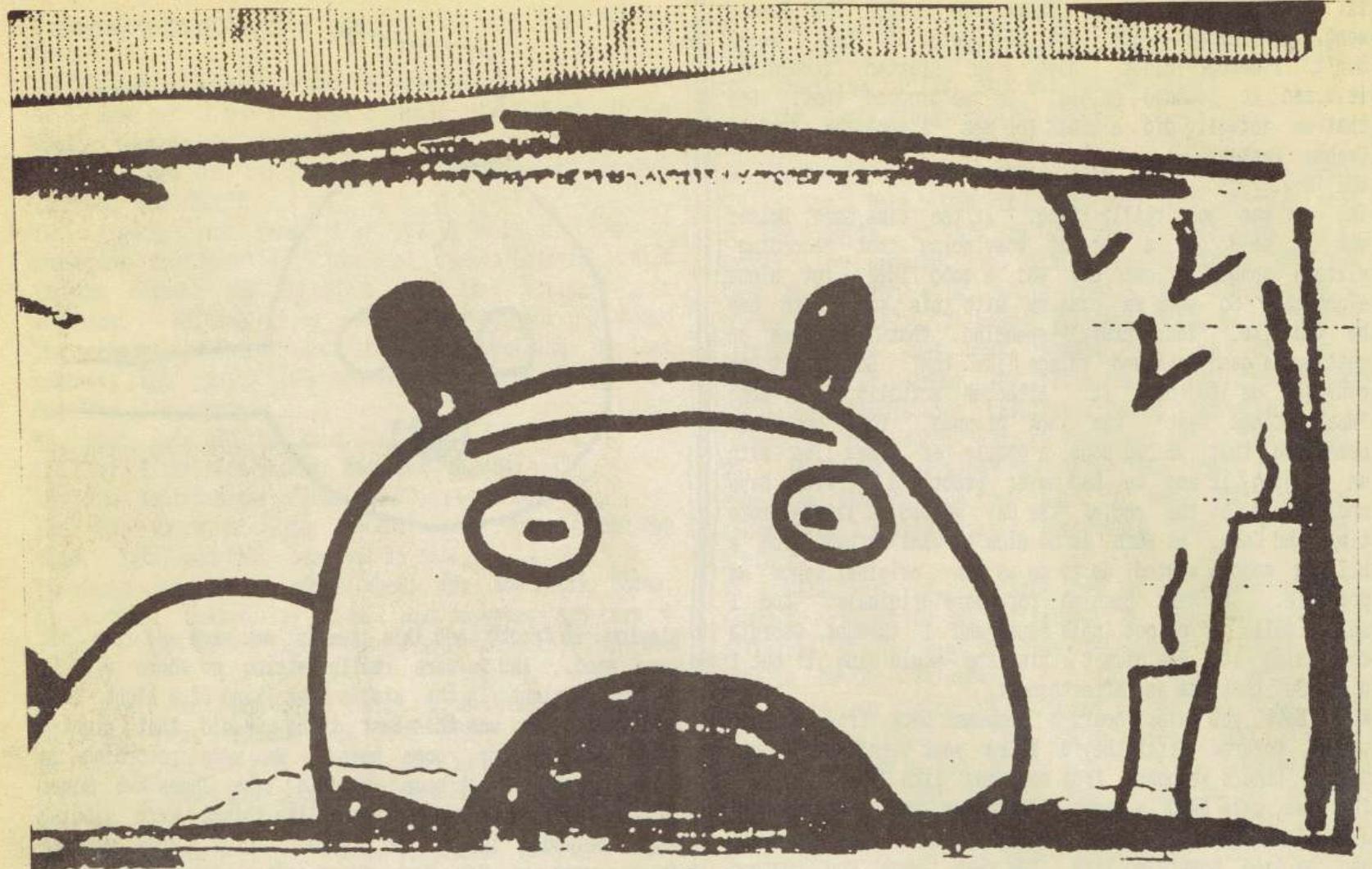
Woolly Bugger: Did you come up with the name “Yo La Tengo”?
Ira Kaplan: I think I was the person who suggested it as a name but I don’t think I picked it–I think it was really Georgia who picked it.
WB: And does the “La” stand for a “feminine it” or does it stand for “her”?
IK: (laughs) You know, I’ve really sort of given up answering that question. The real reason Georgia wanted it was because she wanted a name that wouldn’t mean anything. Neither of us speak Spanish, so… I found the phrase somewhere and it meant something in that context, but really the context we wanted it for was more for its nonsense.
WB: What date did the band start?
IK: Our first show was in December of ’84.
WB: And what was the first recording you had?
IK: The River of Water 45 that came out on our own “Egon” label and that came out in ’85.
[Nonsense out of my mouth about the New York scene, circa 1985, that really didn’t get anywhere and then a drastic jump across many oceans and continents to New Zealand]
WB: Have you been doing things with Chris Knox for a while now (how long have you known him)?
IK: Last year the Tall Dwarfs came to the U.S. for very briefly, I guess you probably didn’t get to see them?
WB: No.
IK: I think they played in San Francisco…So when they came east we did three shows with them, I think…we played Hoboken, Boston, and Philadelphia–yeah, we did three shows with them–and we drove ‘em around and let ‘em use our stuff. We had all met Chris Knox the first time he was here when he was touring with The Clean, but it was the first time we had ever played with him [with his band]. Like this year [I think he means the Seattle show I was at where Mr. Knox came out to sing and be drunk at the end of Yo La Tengo’s set]…I guess only the last night we all played together–that time in Philadelphia. We did “Crush”. We joined the Tall Dwarfs and played “Crush” with them and they came on with us and started doing one song but it quickly became “Crush” again…went back to our hit.
WB: It seems like people have been talking about and getting into New Zealand bands and labels like Xpressway lately, are these things that you’re very into?
IK: Well, not as much as other things…not as much as other people. You know, I read certain magazines and such, and I see this sort of encyclopedic knowledge of every record that’s coming out of that country and that label. I’m certainly interested in it and I’ve got a bunch of records…
[Brief talk about how I saw them do a Dead C. cover in Seattle]
WB: So what have you been listening to a lot lately?
IK: Something we just got that I think we were both impressed by was this record by Epic Soundtracks, Rise Above.
WB: (kinda surprised)
IK: Have you heard that? Really?
WB: No, I haven’t, I sort of discounted that one. I just figured it wouldn’t be something worth listening to…something so far past his earlier stuff.
IK: I’m sorry…his earlier stuff?
WB: Like The Swell Maps.
IK: Yeah, it sounds nothing like Swell Maps. I mean, I like Swell Maps…but it really surprised me–you look at the people on this record [he’s referring to J. Mascis, Lee Ranaldo, and Kim Gordon, I think] and you look at him and it’s really cool…it’s almost like a Standlake Park(?)…I mean, it does sort of relate a little bit to what Nikki Sudden does now, but in a really kind of chamber way…it’s really cool. That was our latest acquisition that I was really impressed by. [Changing the subject over to Fakebook out of the blue]
WB: A friend of mine has this idea that it was a conscious thought on your part to take different pop songs from different eras and record them in a similar style…
IK: Well, sort of. I think when we were choosing what songs to record the mix of songs from different eras and different styles kind of made the groups of songs seem like a better selection. I think that might have influenced our choice of which, of those many songs that we knew, to record. The whole record just kind of happened. When we had played acoustically, generally it had just been just Georgia and I and we had done a couple of shows with an upright bassist…I think three. So we had this idea to make a record–the idea of doing it with a bass and with Dave Schramm was just something that really fell into place. The songs were already picked out before we got in touch with Dave and Al. So we really didn’t know what it would sound like.
WB: I see what you mean.
IK: But there’s still an element of that–I think that’s kind of our idea of how the arrangement of things would make for a richer record.
WB: There’s something about the way the songs…that are so different…flow together because they sound similar, because you’re playing them.
IK: Well, they were all recorded the same day. They’ve definitely got that feel to them.
WB: Were there any songs that you either recorded, or considered recording, that didn’t make it onto the album?
IK: There were two. There was a Dee Dee Ramone but he wrote it…that we–I don’t remember–might have even started recording it…and it sounded so bad. So we dropped that. One that we actually did a track for was “A Song For You” by Graham Parker.
WB: Wow.
IK: It was just really long. At the time Gene Holder was in need of a lot of convincing that recording sixteen songs in one day was a good idea, let alone eighteen. So when we came up with this six-minute one he was like, “You’re crazy”–spending that much time on getting a good take and things like that. So we let him convince us to drop it. Although actually, the song “What Comes Next” was not planned, that one was something that we had done a couple of times live with me singing it and we had never practiced it with Dave and Al and at the end of the day we had a little more time and Gene, as much as he didn’t want us recording a billion songs, wanted us to do as many original songs as possible. He kept pushing for more originals. And I said, well, I’ve got this song and I thought Georgia could sing it. She didn’t think she could sing it but I did. So that was an afterthought.
WB: Have you ever heard a response back from someone you’ve covered after they’d heard your version of their song? Like a response from somebody like John Cale?
IK: We gave NRBQ a tape of Fakebook and I went up to Joey Santiago after that and asked him if he’d heard it and he said something like, “Oh yeah, yeah, you changed the whole feel”–which we did. But he didn’t really say “It was great”, he just said, “You changed the whole feel”….Jackson Browne has yet to comment.
[Now, M.T.V…]
WB: I haven’t seen it yet, but I hear you made a video for “Big Day Coming”, is that right?
IK: Yeah.
WB: Is that completely done and being shown?
IK: (laughs) Well, it’s been done for a long time. Whether it’s being shown, I don’t know. We did it back in the fall. We actually just did another one for “Motel 6”.
WB: Is the video for “Big Day Coming” for the faster and more rock version of the song?
IK: Yeah.
WB: How did recording two versions of the song come about?
IK: Fred Brockman, who was one of the two producers of the record–he got involved with the record early, helping us record demos and this and that–so we were playing him that song in the first version and he reacted… I think he liked it, but he thought it was a nice song but that at eight minutes and slow it might not get across to people as well as it would if it was four minutes and fast. And he asked us if we had ever thought of putting drums on it…we said “no”. And yet, as you may have noticed, we do always like the idea of reconsidering songs and seeing what other angles they can be approached from. So we took that as kind of a challenge. There is one kind of funny take of us playing it “rock” and it’s really new wave and it’s not very good. And we were really getting nowhere with it until one night in the studio when kind of a light bulb went off. It was the last thing we did that night–James had already gone home. We were recording in Hoboken and at that hour it would take James two hours to get back. When it looked like things were winding down, he would leave. So I said I think I know what to do–he went to New York and Georgia played the drums without ever knowing how it went before. She said like, “What am I supposed to play?” and I said, “Just play along, it’ll be fine.”

WB: On that record [Painful] are most of the parts that are, say, drums, bass, and guitar, played live with the three of you playing all at once?
IK: Almost all of it is. Sometimes you then go back and redo–I think the guitar parts sometimes, it depends. But at some point all three of us played, how much of that made it to the record is varied. In fact that [rock version of “Big Day Coming] may be the only song that all three of us didn’t play at once. In fact, we tried it on “Double Dare” but we went back to all three of us playing it.
WB: And with “The Whole of the Law”?
IK: Oh, that was another one.
WB: It was like that as well?
IK: No, that was just…I don’t think there is bass on that one. I think we just did the guitar and added the cymbals…
WB: It’s a cover by who?
IK: The Only Ones.
WB: When were they happening?
IK: They’re a band from England from the late 70’s…They made, I think, three albums…the first two only came out in England but Sony (or CBS) put out a really great collection of the two albums.
WB: Which album is that one (“The Whole of the Law”) on?
IK: Well, the American album Special View has it..but I think it’s not on too many of the records–there’s been a fair number of recent collections that haven’t included it–but it’s definitely on the American album Special View which is the combination of the two (earliest) albums.

WB: I’d be interested in hearing that…
IK: You know, it’s a great song…but that version of the song has a corny saxophone that’s always really irritated me.
WB: I’ve noticed that a few of the covers you’ve done end up being done much better when they’re by you guys. Actually, I bought that Bob Dylan record “Hard Rain” because it has that song “I Threw it All Away” on it. And that version…
IK: Certainly not the best version of that song by Bob Dylan.
WB: …it’s so funny.
IK: I think the version on National Skyline is preferable…some of those later Dylan records…
[Out of questions…]
WB: Anything you have to say?
IK: Not really. As I tell people when they ask that question, I’m happy to answer questions but I don’t have a soapbox…it’s because it gives me a chance to talk about the decline of the old west.
WB: Or the face of pop-culture today or something like that.
(So after briefly talking about how he thinks it’s kinda weird how people are interested in what he has to say, I decide to ask….)
WB: Are you someone who keeps up on pop-culture?
IK: Some of it…almost like scatter shots, there are some things that I know really well and some things that I sort of pride myself on not knowing at all. You know, flipping past “Beavis and Butthead” which would be really easy to watch. I kind of think, well, I’ve never watched it–I think that’s the stance I’ll take for a while. But it really varies…we’re avid consumers.
WB: I took a class last year called “Popular Art and Culture” and the first definition of “Pop Culture” was that it’s culture that you can’t avoid. But I’ve gone long periods of time not knowing what’s going on with pop culture–although, I guess you end up…
IK: I think it would be pretty hard to not know who “Beavis and Butthead” are. You cannot watch the show but… I was watching something last night and somebody was talking about them. I think they’re pretty pervasive. You know Barney–you don’t have to watch the Barney show to know who he is.
WB: Yeah, I’ve never seen it but I know who he is.
IK: It’s amazing, I’ve got nieces and nephews who, you know, are (if Barney turns out to be a leader of a Satanic cult I wouldn’t be surprised) so mesmerized you just think the 1.V. has to be sending out these sounds that only pre-5 year olds can hear. I’m looking at a Barney Doll right now.
WB: You have one?
IK: Well, I’m passing it on to my niece.
WB: Ah-ha.
